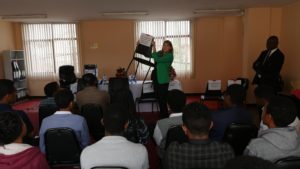- Stay Connected
The Teacher of the Year Went to Ethiopia to Train Educators—and Learned a Lot

Typically, “edutourism” trips, which focus on learning about another country’s education system, center around a few of the usual suspects: Finland, Shanghai, Singapore, etcetera.
But Sydney Chaffee, the 2017 National Teacher of the Year, went somewhere a little different: Ethiopia. Chaffee, who was in the capital city of Addis Ababa for about a week, was asked by officials at the Ethiopian Embassy to visit and present workshops on theater education, interdisciplinary learning, and student-centered learning. Students, teachers, and members of the general public came to the workshops.
“I was … engaging folks on what we have in common,” Chaffee said in an interview with Education Week Teacher.
She also wrote on her personal blog that she learned to step back and listen during the trip, instead of “play[ing] the role of expert.” The trip, she wrote, was filled with “opportunities to collaborate.” That mindset has broader implications to education in the United States, she wrote:
“How can administrators and teacher leaders ensure that professional development opportunities, whether they are weekly staff meetings or once-in-a-lifetime chances to meet with teachers from another country, are collaborative?” she wrote. “How do we honor all participants’ expertise and ideas? How do we stay grounded in the fact that we all have more to learn, whether we’re introduced as the expert or the novice in the room?”
At times, instead of giving her own recommendations to Ethiopian educators, Chaffee wrote that she asked other local teachers to share advice—”and it was 10 times more powerful and helpful.”
In addition to the importance of collaboration, here are Chaffee’s takeways from the trip:
‘We Can Hold One Another Up’
Ethiopia is one of the poorest countries in the world, and the total adult literacy rate is 39 percent, according to UNICEF.org. The United States is one of the richest countries in the world, and the literacy rate is around 80 percent.
Despite these disparities between the United States and Ethiopia, Chaffee discovered similar themes from her conversations with educators to what she has heard in the United States.
“Teachers [at private schools] feel like they could do more student-centered [learning], be more creative and innovative,” she said, adding that public school teachers “expressed a real desire to be more creative, more innovative, but they felt constrained by policies.”
U.S. teachers face some of the same challenges, Chaffee said: “How do we meet all of our students’ needs? How do we work creatively within [district constraints]?”
Ethiopian teachers were also “dismayed by this notion that teachers are not respected,” she said—a similar complaint among teachers here.
“As teachers, we can hold one another up,” Chaffee said she told educators in Ethiopia. “I think the first thing is just to remember that as teachers, our job is to be creative … remembering that and keeping that spirit is really important.”
‘Education Is Universal’
“When I went in and taught these two theater workshops, I was so struck by how much [the students] reminded me of my kids,” Chaffee said, adding that people had told her that Ethiopian students are used to instructional techniques that rely on memorization and rote call-and-response. The students wouldn’t be used to the American style of teaching, people said, and it might be difficult to engage them.
She had the opposite experience. “They were silly, goofy, incredibly excited,” Chaffee said. “They reminded me so much of my students in their enthusiasm, in their excitement, in their brilliance.”
“Education is universal,” she added.
Chaffee shared a poem by an Ethiopian author (Bewketu Seyoum) that she thought might engage students—and it did. Teachers could choose just one poem to supplement the textbook they have to teach, Chaffee said—a simple way to open up creativity in the classroom.
Trying a new method of teaching “can feel really overwhelming and can sometimes feel like an indictment,” Chaffee told the educators.
Instead of trying to overhaul everything, she urged, “find what’s the little bit of wisdom or the little technique that’s worth trying, and try that thing. Then if it works, find another little thing.”
Ethiopia Has Lessons to Teach Us
Chaffee, who teaches humanities, talks to her students a lot about colonialism and its negative side effects—so visiting Ethiopia, one of the few African countries that was never colonized, was eye-opening. Ethiopians were proud of their independence, and told her so repeatedly. The country is also home to Lucy, a 3.2 million-year-old skeleton of a human ancestor. One man came up to her and asked, Do you know that humans started here?
Later on, students performed a play to demonstrate their English skills that covered the Battle of Adwa, in which Italy unsuccessfully tried to colonize Ethiopia.
“Everyone in the room knew the history,” Chaffee said. “That sense of history and sense of pride in who they are and how important their country and home is, is something I’ll bring back to my students as sort of a contrast to the history of colonialism.”
Another lesson was more rooted in pedagogy: During a workshop, Chaffee noticed how a school’s principal differentiated the content for teachers who were proficient in English and those who were not. That gave her some ideas to try with her own students.
“These connections are making me smarter and more emphathetic,” Chaffee wrote in her blog post. “And I know, even though I won’t be able to prove it until next fall, that they’re making me a better teacher, too.”
